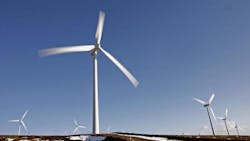Microsoft Corp., GM, Honda, and dozens of other large companies, many of them manufacturers, are joining forces with environmental groups to promote the development of 60 gigawatts of renewable energy by 2025.
That’s enough to replace all the coal-fired power plants in the U.S. expected to retire in the next four years. The Renewable Energy Buyers Alliance was formed to break barriers that companies say they face with utilities and regulators in their efforts to reduce carbon emissions, the companies said on a conference call Thursday.
Large energy consumers that want to run on cleaner energy than utility grids provide have relied for years on buying power directly from renewable energy developers through power purchase agreements. Those opportunities are getting harder to find in some states and are not available to smaller companies, said Brian Janous, director of sustainability at Microsoft. He leads an effort to cut its carbon emissions by 9.5 million metric tons that began in 2012.
Cooperation Needed
“Much of the activity so far has been in the form of PPAs and that’s an efficient way to secure renewable energy, but it’s challenging for small companies,” Janous said on the call. “We have a long way to go, and the only way we’re going to get there is collaboration. We need utilities to come in as aggregators and provide new opportunities.”
More than 60 companies were joined in the effort by Business for Social Responsibility, the World Resources Institute, the Rocky Mountain Institute and the World Wildlife Fund.
One of the companies in the alliance, Facebook, wants to get half of its electricity from renewable sources by 2018 and eventually meet all of its needs from carbon-free sources, said Bill Weihl, company director of sustainability.
“Access to clean energy is one aspect we look for when we site data centers,” Weihl said. “We’re working together with utilities and regulators to design new products so we can all buy more clean energy.”
The group plans to meet at Microsoft headquarters in Redmond, Washington, next week to share experiences and ideas on how to encourage utilities to let businesses buy more energy from wind turbines and solar panels.
“We know there’s an appetite,” said Letha Tawney, director of utility innovation at the World Resources Institute. “In some markets there are no options. We’re finding that utilities are excited to offer something.”
About the Author
Bloomberg
Licensed content from Bloomberg, copyright 2016.
